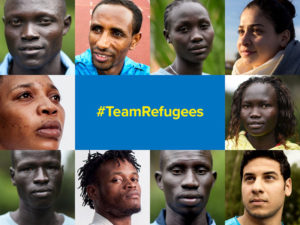In the midst of the world’s greatest sporting event is a small group of competitors representing history’s greatest refugee crisis. For the first time ever in Olympic competition a Refugee Olympic Team is marching and competing under the Olympic banner. These ten athletes represent over 21.3 million refugees worldwide—individuals who have fled their countries due to persecution and violence. The team of ten hails from four countries – the Democratic Republic of Congo, Ethiopia, South Sudan and Syria. All of the athletes fled their countries to escape civil war and conflicts that have seen the commission of mass atrocities and the targeting of civilians.
When unveiling the composition of the team, IOC President Thomas Bach said: “These refugees have no home, no team, no flag, no national anthem. We will offer them a home in the Olympic Village together with all the athletes of the word. The Olympic anthem will be played in their honour and the Olympic flag will lead them into the Olympic Stadium. This will be a symbol of hope for all the refugees in our world, and will make the world better aware of the magnitude of this crisis. It is also a signal to the international community that refugees are our fellow human beings and are an enrichment to society. These refugee athletes will show the world that despite the unimaginable tragedies that they have faced, anyone can contribute to society through their talent, skills and strength of the human spirit.”
Five of the athletes are runners who were recruited from the Kakuma refugee camp in Kenya where they have been residing for 10 years or more since fleeing war in Southern Sudan. James Chiengjiek, Yiech Biel and Paulo Lokoro are all of the Lost Boys generation who fled South Sudan to avoid being conscripted as child soldiers, while the female runners, Rose Lokonyen and Anjelina Lohalith fled to escape the violence in their towns.
South Sudan, now an independent state since 2011, has been plagued by a new civil war since December 2013, causing nearly one million refugees to flee the country. By competing in Rio, Yiech Biel believes, “I can show to my fellow refugees that they have a chance and a hope in life,” while Rose Lokonyen feels she “will be representing my people there at Rio, and maybe if I succeed I can come back and conduct a race that can promote peace, and bring people together.”
The two Congolese athletes, Popole Misenga and Yolande Mabika, are both from eastern Democratic Republic of Congo which has seen armed conflict and mass atrocities since the mid 90’s. Popole’s mother was killed in the violence, and at only nine years old he fled his village and was rescued and taken to the capital of Kinshasa after eight days of hiding in the forest. Yolande was also rescued and taken to Kinshasa after she had become separated from her parents.
Both found the discipline of Judo a positive influence on their lives and eventually excelled enough to make the Congolese national team. Making the national team allowed the two to travel and compete, but not escape the harsh conditions they were born into. Their coaches would confiscate their passports and money and lock them in hotel rooms or cages with little food when they lost their matches. In 2013, the two had enough and snuck out of the hotel to apply for asylum in Rio where they have been since then. “My message to the refugees of the world would be not to give up on hope and to keep believing, to have faith in their hearts,” states Yolande.
The two athletes from Syria, Rami Anis and Yusra Mardini, share a common story with many Syrian and African refugees. After fleeing the violence in their country, they took sail for the European shores under treacherous circumstances in hopes of gaining asylum. The two of them were among the lucky ones who made the crossing where thousands have died each of the last few years. Rami rowed himself with tree branches while Yusra along with 17 other refugees made the trip in a dinghy made for six. The motor of the vessel carrying Yusra failed and she, along with her sister, swam for over three hours pulling the boat to safety on the shore of Lesbos, Greece.
Whether or not these athletes medal is irrelevant. They have been the subject of many media profiles and social media posts. Simply by competing on the Olympic stage, they have brought international attention to the magnitude of the refugee crisis and have become a symbol of hope for refugees worldwide.
Just as it is the wish of each athlete to bring hope to their people, it is our hope that the spotlight being shined during the Games does not fade and that the international community will respond with solid policies that will make a real difference for the millions of people that have been displaced by war and mass atrocities.
**This post was written by Susan Brooks, a long-time JWW volunteer, friend, and consultant.**


